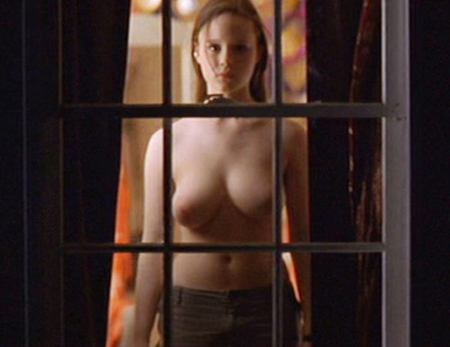« Psycho (1998) – Movie Review | Home | The Fountainhead (1949) – Movie Review »
American Beauty (1999) – Movie Review
By Robert L. Jones | June 6, 1999

There are only two compelling reasons to watch "American Beauty," and Thora Birch has both of them
Look Closer: Hectoring, Moralizing, Stridency
[xrr rating=2.5/5]
American Beauty. Starring Kevin Spacey, Annette Bening, Thora Birch, Wes Bentley, Mena Suvari, Chris Cooper, Peter Gallagher, Allison Janney, Scott Bakula, Sam Roberts, and Barry Del Sherman. Screenplay by Alan Ball. Directed by Sam Mendes. (Dreamworks SKG, Color, 122 minutes. MPAA Rating: R.)
American Beauty opens and closes with Kevin Spacey’s narration from the grave, an idea lifted from Billy Wilder’s 1950 masterpiece Sunset Boulevard. (The producers and leads make sure to drop Billy Wilder’s name every other sentence or so during media interviews, just to subtly drive that point home).
Similarities end there. The caustic and brilliant cynicism of Wilder’s and Charles Brackett’s last screen collaboration has been replaced by Alan Ball’s pose of same. When it came out a couple months ago, there was a lot of talk about how “courageous” this movie’s producers were. I saw no courage in it, but merely a clichéd portrait of suburbia.
Suburbia as a soul-draining no man’s land is nothing new in Hollywood. The Man in the Gray Flannel Suit (1955), explored similar themes, and Gregory Peck even shared the same (by-now hackneyed) profession—advertising man—as Kevin Spacey’s anti-hero, Lester Burnham (this surname is another filch from the Wilder Oeuvre, from the dipsomaniacal The Lost Weekend). In Flannel, Peck puts his job on the line to maintain his integrity, and end up winning. Spacey’s “modernized” rat boosts his severance package by blackmailing his firm’s “efficiency expert,” and then uses the proceeds to forever chuck his responsibilities.
The movie’s premise, that Spacey has (unbeknownst to him) just a year to live shows him in the throes of a mid-life crisis in which we find him “living each day as if it were my last.” So, does he go and write the great American novel? Does he reinvigorate his neglected family life? No; he quits his dead-end job to work at a fast food joint (obviously, a much more fulfilling career), exercises, buys a red Firebird (wow! That’s a new one on me!) and lusts after his teenage daughter’s best friend (Mena Suvari). Whereas Wilder and Brackett conjured memorable flesh-and-blood characters from the printed page, Beauty scenarist Ball has a reverse-alchemy going on: Despite lots of gratuitous flesh, the characters come off as two-dimensional cardboard cutouts.
There was a saying in the dramatic world, “the play’s the thing.” Now, “the agenda’s the thing.” All the characters in this movie aren’t really characters at all, but representations, stand-ins for various social and political agendas.
American Beauty is marketed with the slogan “Look Closer.” “Look closer,” you’ll see that the gay couple (Scott Bakula and Sam Robards) across the street is just like you and me; the “macho,” homophobic, Marine (Chris Cooper) is really a repressed homosexual (who didn’t see that coming a mile away?). The “weird” drug-dealing peeping-Tom (Wes Bentley) is really a well of philosophical profundity, rivaling Gandhi in depth and Mother Teresa in altruistic impulse. The “popular” cheerleader (Suvari) is actually this shy, lonely virgin (yeah, right), and the chiseled-chin real estate guy (Peter Gallagher) is your typical Hollywood capitalist—shallow, ruthless, a philanderer and (big surprise) a gun nut. No matter how much I “looked closer,” I couldn’t see any real people, or even idealized people that used to populate Hollywood fare. Instead, I kept seeing this P.C. playbook, written by some narcissistic baby-boomer who demands people view his movie with an open mind, but who himself sees life with blinders on.
As character studies, Lester and his wife Carolyn (played by Annette Bening) ain’t Joe Gillis and Norma Desmond. In Sunset Boulevard, William Holden and Gloria Swanson weren’t exactly people you’d want in your living room, but you’d certainly go to the Bijou to study them night after night. Their disturbing relationship was larger-than-life human nature at its darkest and most melodramatic. With American Beauty, it’s the people that have gotten small.
Occasionally, I actually sympathize with Lester, especially when he’s being sarcastic to his wife. But all-in-all, the characterizations are just laughable at best: In one scene, Annette Bening becomes a “gun-nut” and goes to the shooting range to work out her frustrations. She manages to get tight shot groups despite her rising arms, twisted, manic, facial expression and heavy breathing while shooting. It’s a scene that could only have been written by an anti-gun activist with an axe to grind. Real sportsmen at firing ranges know they can’t shoot well unless they’re calm and collected.
But that would contradict the moviemakers’ agenda. Likewise with the homosexual couple: They’re merely props for Mendes’ and Ball’s politics. Out of all the main characters in the movie, they have the least screen time (only about 2-3 minutes total), and are only in the script to represent “normality.” With all the talk the P.C. crowd devotes to the “trivialization” and “othering” of “marginalized peoples,” you’d think someone would’ve complained about how trivial these gay characters were. Aside from idly chatting with neighbors, delivering flowers to new arrivals on the block and jogging, the viewer knows nothing about them. But, since Jim and Jim weren’t written to be interesting beyond their function as poster children, Ball and Mendes didn’t see the need to.
Ultimately, “look closer” is a great marketing gimmick, because upon looking closer, the viewer is left as bereft of any inspiration or entertainment as upon entering. It’s is a new spin on an old Grimm brothers fable, “The Emperor’s New Clothes”: If you can’t understand it, then it must be deep. If you don’t agree with Mendes’ and Ball’s worldview, then you must be a social regressive. If you don’t think suburban life is as bad as they paint it, then you’re not looking “closely” enough, and, if upon looking closer, you find it shallow and vapid, then you lack depth.
In reality, it’s Ball and Mendes who lack depth: You can’t have your cynical cake and eat your sugarcoated agenda, too. Proof lies in another movie released later this year, Election, by writer and director Alexander Payne, which explored identical themes as this movie. However, they’re really worlds apart: Election bristles with real cynicism, and Payne presents people like you’ve actually known in your lifetime, letting you bask in their hilarious pettiness, bitterness, sadness, euphoria, and delusions of grandeur. Payne actually gets to the heart of what motivates them in a panoply of human nature. Matthew Broderick and Reese Witherspoon play internally motivated people, and thus come off as believable characters, complete in themselves. The cast of American Beauty are merely crude marionettes dancing on the strings manipulated by an all-thumbs screenwriter and director.
Look closer. There ain’t nothing there.
Robert L. Jones is a photojournalist living and working in Minnesota. His work has appeared in Black & White Magazine, Entrepreneur, Hoy! New York, the New York Post, RCA Victor (Japan), Scene in San Antonio, Spirit Magazine (Canada), Top Producer, and the Trenton Times. Mr. Jones is a past entertainment editor of The New Individualist.
Topics: Black Comedies, Comedies, Dramas, Movie Reviews | Comments Off on American Beauty (1999) – Movie Review
